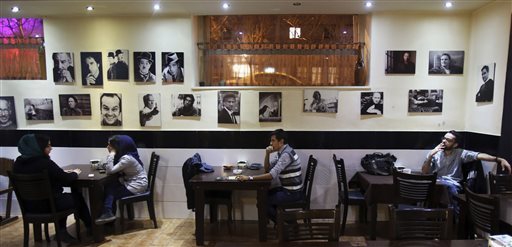 TEHRAN, IRAN�� Shoulder to shoulder, cheek to cheek, young women and men sit next to each other while a thick film of cigarette smoke fills the dimly lit cafe in central Tehran. Bob Dylan's "Knockin' On Heaven's Door" blares from the speakers.
TEHRAN, IRAN�� Shoulder to shoulder, cheek to cheek, young women and men sit next to each other while a thick film of cigarette smoke fills the dimly lit cafe in central Tehran. Bob Dylan's "Knockin' On Heaven's Door" blares from the speakers.Young Iranians with slick smart phones and packs of American-made cigarettes who frequent the cafe come for the chance to hang out, away from the eyes of moralizing elders. They also form a bloc of strong support for moderate President Hassan Rouhani as he works to allow greater social freedom in the Islamic Republic.
It is a reflection of a boom in cafe culture that has led to a mushrooming of similar coffee shops over the past two years, providing an outlet for young middle-class Iranians who suffer from a lack of public places to meet.
With a box of black Marlboros on his table, Mahnaz Ghassemi, 20, who voted for Rouhani in June, said she comes to the cafe for the freedom it offers.
"Here, I can smoke freely. At home, both my mom and dad regularly complain about it," she said.
Majid Rouhian, 24, sips his double espresso while chatting with his girlfriend Maryam. Both voted for Rouhani.
"In the past we had fewer chances to meet," he said. "In recent years we have more chances simply because of increasing number of public places, like this."
For years, Iranian authorities kept the number of cafes limited since they were seen as a symbol of Western influence and places to spread non-Islamic beliefs. But reports of cafes being shut because they violate "Islamic dignities" have dropped markedly in recent months, suggesting a growing tolerance by the authorities.
During his campaign, Rouhani vowed that young people would have more social freedom.
"We should not intervene in private life. ... We should know that young people are energetic so we should not be tough on them. It will not lead to positive results," he said.
Tehran-based economic and political analyst Saeed Leilaz believes cafes symbolize the network of young people who played an essential role in bringing Rouhani to power.
"The role of the young people, those who sit in cafes, was a significant ... part of Rouhani's success," he said.
Leilaz said authorities learned they had to give youth more freedom and a bigger role in society as the economic failures of former President Mahmoud Ahmadinejad's administration grew more acute in recent years. The allowance of more and more cafes symbolizes that opening.
"If getting government permits for cafes gets easier, then their number would match the number of mosques in Tehran," said Leilaz. There are some 2,000 mosques in Tehran, according to official statistics.
Cafe association head Eskandar Azmoudeh said the number of caf�s has roughly quadruped over the past two years, from around 20 or 30 up to around 80.
Fashid Aslani, sitting in one of the branches of his Raees chain of coffee shops in northern Tehran, said the number of cafes is growing rapidly, reflecting a change in a society where tea was for centuries the main hot drink.
More than half of Iran's 76 million citizens are under age 30. Many juice shop owners who have watched those young customers flock to cafes have converted their businesses to coffee shops to keep up with the changing times.
Authorities tolerate loud Western music in the cafes � a pleasure once outlawed as un-Islamic after the 1979 Islamic Revolution that brought Islamists to power. Many of the new shops are decorated with replica paintings and pictures of local and foreign celebrities. They typically offer free high-speed Wi-Fi � a major draw for many customers.
The loosening of the reins started even before Rouhani's election.
The number of Western-type cafes � which first appeared in Iran in 1920s � began to increase in 2011, two years after Ahmadinejad's controversial re-election that led to a massive crackdown on opposition activists.
In another cafe on Tehran's Gandhi Street, Anahita Kazemi, a 21-year-old painting student, said the place is a refuge for her and friends to enjoy each other's company.
"We freely sit together here for talks about galleries, movies and celebrities, like we did in parks or private places in the past," she said.
Azemoudeh's deputy, Mohammad Khoshniat, added that the cafes provide a place for young couples who have few options.
"Those who want to meet ... or get engaged choose cafes for the first steps," he said.
Mehrdad Khadir, a social columnist for the moderate Asr-e Iran news website, said cafes provide "fewer restrictions on relations between the genders," compared to other places in the Iranian society.
"Girls and boys feel secure there," he said, adding that cafe goers "supported Rouhani in the 2013 elections simply because Rouhani promised more social freedom."
Pejman Mousavi, another Tehran-based social columnist working for pro-reform Etemad daily, said young middle class people seek nontraditional lifestyles.
"A new generation of middle class young people is after a new version of life, different from their parents," Mousavi said.
By Sun Herald
The Iran Project is not responsible for the content of quoted articles.











